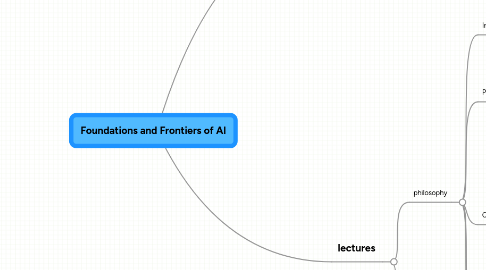
1. lectures
1.1. philosophy
1.1.1. Intelligence
1.1.1.1. topics
1.1.1.1.1. Introduction
1.1.1.1.2. What is intelligence?
1.1.1.1.3. Strong/weak AI
1.1.1.1.4. Turing Test
1.1.1.2. readings
1.1.1.2.1. (form groups, pick one topic, identify key papers, present about 6 slides summarizing your findings)
1.1.1.2.2. Lessons from a Restricted Turing Test, Stuart M. Shieber
1.1.1.2.3. A. M. Turing (1950) Computing Machinery and Intelligence. Mind 49: 433-460.
1.1.1.2.4. The Turing Test: The First Fifty Years
1.1.1.2.5. ELIZA
1.1.1.2.6. PARRY
1.1.1.2.7. Loebner Prize
1.1.1.3. exercises
1.1.2. Physicality
1.1.2.1. topics
1.1.2.1.1. Chinese room argument
1.1.2.1.2. physicality
1.1.2.1.3. symbol grounding
1.1.2.2. readings
1.1.2.3. exercises
1.1.3. Computation
1.1.3.1. topics
1.1.3.1.1. Turing-Church thesis
1.1.3.1.2. physical limits of computation
1.1.3.1.3. Quantum Computing
1.1.3.1.4. Hypercomputation
1.1.3.2. readings
1.1.3.3. exercises
1.1.4. Dualism and Free Will
1.1.4.1. topics
1.1.4.1.1. theories of consciousness
1.1.4.1.2. free willl, dualism
1.1.4.1.3. neuroscience of free will
1.1.4.1.4. legal responsibility and free will
1.1.4.2. readings
1.1.4.3. exercises
1.1.5. Emotions and Emotional Computing
1.1.5.1. topics
1.1.5.1.1. biological basis of emotions
1.1.5.1.2. evolution of emotions
1.1.5.1.3. simulations of emotions
1.1.5.1.4. sentience vs emotions
1.1.5.2. readings
1.1.5.3. exercises
1.1.6. Simulation Hypothesis
1.1.6.1. topics
1.1.6.1.1. virtual worlds
1.1.6.1.2. the simulation hypothesis
1.1.6.2. readings
1.1.6.3. exercises
1.1.7. Game Theory and Omnipotence
1.1.7.1. topics
1.1.7.1.1. game theoretic analysis of behavior
1.1.7.1.2. omnipotent agents
1.1.7.2. readings
1.1.7.3. exercises
1.2. technology
1.2.1. Scientific Method
1.2.1.1. topics
1.2.1.1.1. scientific method
1.2.1.1.2. automated scientific discovery
1.2.1.2. readings
1.2.1.3. exercises
1.2.2. Evolution of Mind
1.2.2.1. topics
1.2.2.1.1. evolutionary perspective
1.2.2.1.2. evolution of behavior
1.2.2.1.3. evolutionary psychology
1.2.2.2. readings
1.2.2.3. exercises
1.2.3. Mind Reading
1.2.3.1. topics
1.2.3.1.1. fMRI, evoked potentials
1.2.3.1.2. mind reading
1.2.3.1.3. augmented cognition
1.2.3.1.4. direct brain interfaces
1.2.3.2. readings
1.2.3.3. exercises
1.2.4. Biomimetics
1.2.4.1. topics
1.2.4.1.1. synthetic biology
1.2.4.1.2. organic computing
1.2.4.2. readings
1.2.4.3. exercises
1.2.5. Nanotech
1.2.5.1. topics
1.2.5.1.1. nanotechnology
1.2.5.1.2. transhumanism
1.2.5.1.3. the singularity
1.2.5.2. readings
1.2.5.3. exercises
2. course
2.1. Lectures: Room 48-462 Time Thursdays, 1:45 - 3:15 pm
2.2. Exercises: TBD
2.3. Office Hours
2.3.1. Course Assistants: TBD
2.3.2. Lecturer: send mail to secretary@iupr.com
2.4. Grading
2.4.1. exercises are a prerequisite for the final exam
2.4.2. exercises consist of
2.4.2.1. reading
2.4.2.2. preparation of small presentations for each recitation
2.4.2.3. also: do something online, collect information, find papers, and then present
2.4.2.4. you must bring your collection of completed exercises (slides) to the oral exam
